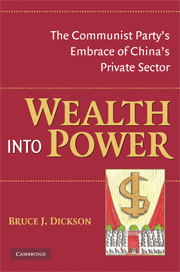Book contents
- Frontmatter
- Contents
- List of Tables and Figure
- Acknowledgments
- 1 Introduction
- 2 The Party's Promotion of the Private Sector
- 3 Co-opting the Capitalists
- 4 Bridges and Branches: The CCP's Institutional Links to the Private Sector
- 5 Views on the Economic, Political, and Social Environments
- 6 Private Entrepreneurs in Public Service: Participation in China's Formal Political Institutions
- 7 The Ripple Effects of Privatization: Corruption, Inequality, and Charity
- 8 Conclusion
- Appendix: Survey Design
- Bibliography
- Index
7 - The Ripple Effects of Privatization: Corruption, Inequality, and Charity
Published online by Cambridge University Press: 05 September 2012
- Frontmatter
- Contents
- List of Tables and Figure
- Acknowledgments
- 1 Introduction
- 2 The Party's Promotion of the Private Sector
- 3 Co-opting the Capitalists
- 4 Bridges and Branches: The CCP's Institutional Links to the Private Sector
- 5 Views on the Economic, Political, and Social Environments
- 6 Private Entrepreneurs in Public Service: Participation in China's Formal Political Institutions
- 7 The Ripple Effects of Privatization: Corruption, Inequality, and Charity
- 8 Conclusion
- Appendix: Survey Design
- Bibliography
- Index
Summary
The CCP's economic reform strategy, and in particular its reliance on the private sector as the engine of growth, has generated rapid, sustained growth. One of the CCP's sources of legitimacy is its ability to make the economy grow, and it has succeeded in this quest. One by-product has been its growing role in the global economy and the international system more generally. This in turn has helped fuel growing national pride, another source of the CCP's legitimacy. At the same time, its strategy of embracing the private sector has also had a variety of more negative consequences, some intended (such as regional disparities in economic development), others unintended but predictable – environmental degradation, corruption, massive loss of industrial jobs, rising income inequalities, and the resulting social and political problems that these other issues have brought about. These ripple effects threaten to undermine a third source of the party's legitimacy: its ability to maintain social order and political stability.
This chapter will focus on two of these ripple effects – corruption and inequality – which are arguably the most politically salient. These problems are in large part the consequence of its reform strategy and its reliance on the private sector as the primary engine of growth. The corrupt ties between communist and capitalist cronies have drawn attention to the inherently unequal and unfair practices that govern the market in China. Similarly, the CCP's daitou zhifu doctrine (“take the lead in getting rich”) has justified the formation of a nouveau riche and acknowledges that the opportunity to get rich is unevenly distributed.
- Type
- Chapter
- Information
- Wealth into PowerThe Communist Party's Embrace of China's Private Sector, pp. 199 - 236Publisher: Cambridge University PressPrint publication year: 2008



